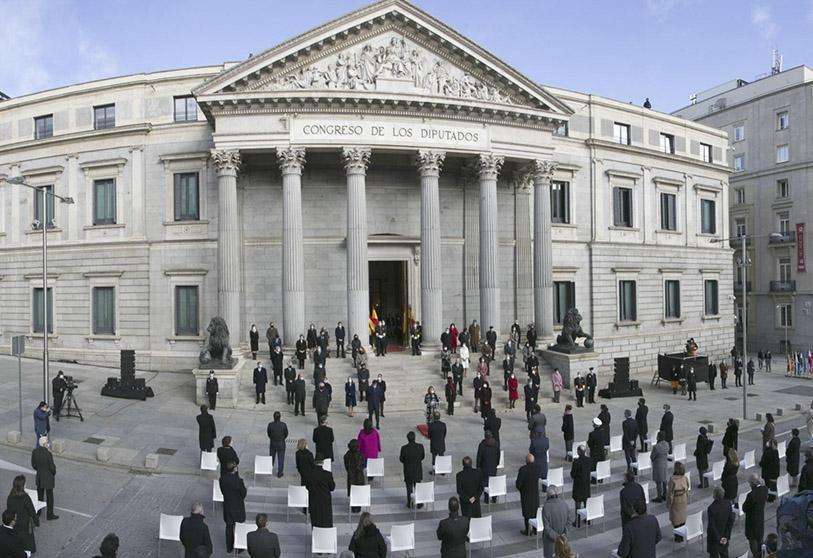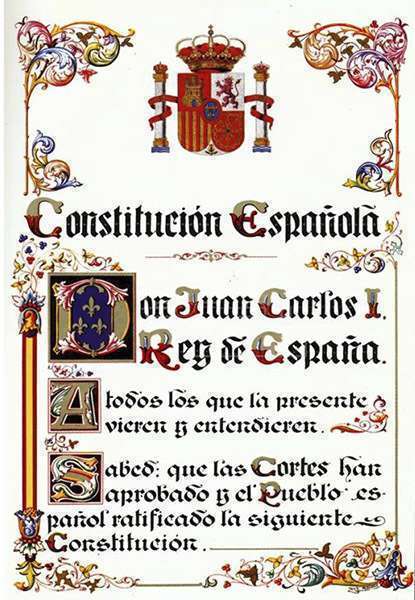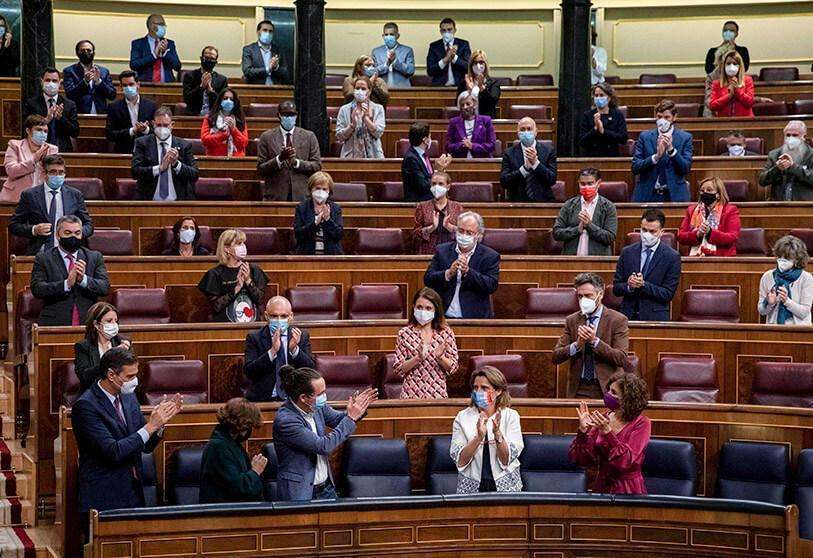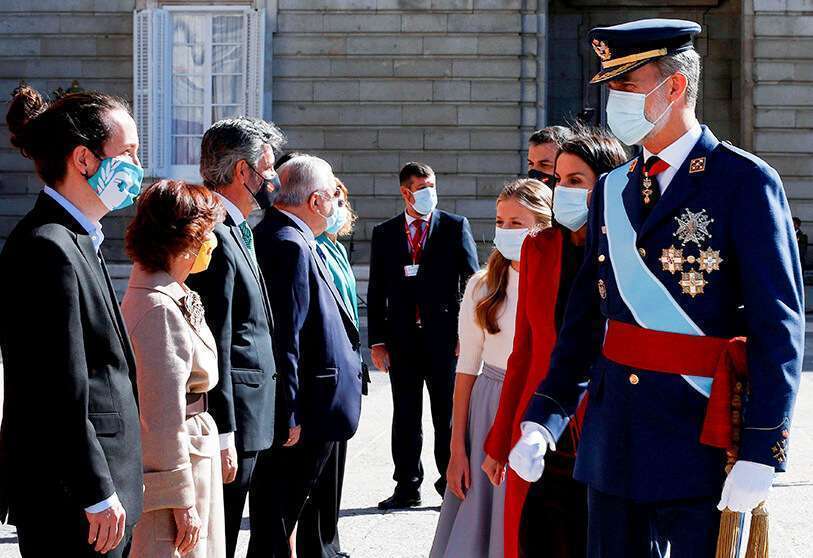Freedom of expression

I am publishing this work on the day of the 42nd anniversary of the Spanish Constitution (EC). A day that should be one of celebration and vainglory for having given it to us and having enjoyed it for so long, but nevertheless, its brilliance and continuity are today frankly threatened by the parties that form or support the government and because, in addition, they do not intend to modify it through the channels that the Magna Carta itself includes, but through the cat's eye or the back door. And by doing so, they are breaking Spain into a thousand or more pieces, however much the president of the government attempted to calm the frenzied mood yesterday by releasing yet another of his habitual and solemn but empty promises; promises which, as is his custom, are instantly broken and soon forgotten as if they had never existed. The purpose of this paper is to analyse and describe the restrictions imposed by the military on the use and enjoyment of a large part of their freedoms, especially freedom of expression, and to denounce, on such a special and timely day and moment, the situation of excessive control that the executive has been forcing on this group in a systematic, inelegant and ineffective manner.
Democratic societies base their foundations on a series of immovable and highly respected principles and rights that give them strength and vigour; among these we should highlight the right to freedom of expression, a right that was already included in the Declaration of the Rights of Man and of the Citizen of 26 August 1789 when it was approved by the French National Constituent Assembly and which established that "the free communication of thoughts and opinions is one of the most cherished rights of man". This declaration is considered to be one of the fundamental documents of the French Revolution in terms of defining personal and community rights, in addition to universal rights.
Initially and after the analysis of a wide bibliography and legislation on the concept, it can be assured, that the freedom of expression has the purpose of protecting the frank manifestation of thoughts, ideas and opinions issued through any means and by any person individually or collectively. It is a concept that allows subjects to manifest their ideologies, thoughts and beliefs, without them being able or required to suffer any interference.

Among the most recent international legislation, the one compiled in the various agreements reached in the UN appears and of it the Universal Declaration of Human Rights stands out, approved by the General Assembly on 10 December 19481 , signed by Spain in 1977 and ratified in 1979, which in its article 19 includes and alludes to this concept, establishing literally that "Everyone has the right to freedom of opinion and expression; this right includes freedom to hold opinions without interference and to seek, receive and impart information and ideas through any media and regardless of frontiers".
At EU level there is also a wealth of legislation on the same subject, most notably a matrix document on which the precepts governing human rights, as well as restrictions on them, are based, known as the Convention for the Protection of Human Rights and Fundamental Freedoms (ECHR).
This document clearly addresses the right that is the object of study and the restrictions on its exercise. In particular, despite the fact that Article 10(1) of the ECHR proclaims the right of everyone to freedom of expression, which includes freedom of opinion and freedom to receive or impart information or ideas, paragraph 10 2, literally states that 'The exercise of these freedoms, which carries with it duties and responsibilities, may be subject to certain formalities, conditions, restrictions or sanctions provided for by law, which are necessary in a democratic society in the interests of national security, territorial integrity or public safety, for the prevention of disorder or crime, for the protection of health or morals, for the protection of the reputation or rights of others, for the prevention of the disclosure of confidential information or for ensuring the authority and impartiality of the judiciary'.
There are numerous judgments that have created jurisprudence in this sense and therefore it may be said that even if members of the armed forces (ASF) are not explicitly or implicitly cited as being the recipients of a restriction in the exercise of the freedoms enjoyed by other citizens, it seems clear and established that this group may be affected by the broad-spectrum restrictive clauses listed in the aforementioned Article 10(2) of the ECHR.
Article 10 of the 1978 EC provides that "the rules relating to fundamental rights and freedoms recognised by the Constitution shall be interpreted in accordance with the Universal Declaration of Human Rights and international treaties and agreements on the same subject matter ratified by Spain".
For the sake of greater detail, Article 20 is devoted to the development of this concept and, at the same time, provides it with greater content by listing a series of rights; specifically, it states literally that
"Rights are recognised and protected:
a) To freely express and disseminate thoughts, ideas and opinions by word, writing or any other means of reproduction.
b) To literary, artistic, scientific and technical production and creation.
c) To academic freedom.
d) To freely communicate or receive truthful information by any means of dissemination. The law shall regulate the right to a conscience clause and professional secrecy in the exercise of these freedoms.
2. The exercise of these rights may not be restricted by any kind of prior censorship.
3. The law shall regulate the organisation and parliamentary control of the media dependent on the state or on any public entity, and shall guarantee access to these media by significant social and political groups, respecting the pluralism of society and the various languages of Spain.
4. These freedoms are limited by respect for the rights recognised in this Title, by the provisions of the laws which develop it and, especially, by the right to honour, privacy, self-image and the protection of youth and children.
5. The seizure of publications, recordings and other information media may only be agreed upon by virtue of a court ruling".

From what has been gathered so far, it can be stated that it is not necessary to be a great expert in the law to be able to appreciate and deduce that from the literal text of the Spanish Constitution, both freedom of expression and the rest of the freedoms recognised by the said article are the core, characteristic and shaping elements of any society that claims to be democratic.
As a consequence of the above, it could be said that without freedom of expression, both in the individual and in the collective aspect, there could be no participation or opinion of the members of society in political and democratic decision-making. This suggests that we are dealing with a fundamental human right which, in addition, is closely related to and presupposes the free exercise of other rights and freedoms (especially ideological, religious and religious freedom, the right to assembly, demonstration and the right to participate in public affairs).
Behind this generic definition, questions soon arise regarding the content, scope and limits of freedom of expression which affect and are addressed by practically all branches of the law and by the Constitutional Court (CC) itself.
In order to understand more clearly the complexity of the system and the tangle of precepts - some not very clear and practically imposed, apparently, without a strong justification - on which the restrictions to the right to freedom of expression for active personnel of the ASF are based, I have had to gather literally some paragraphs from the complete and detailed analysis of the situation and its consequences presented in Professor Álvaro Sedano's reference study2.
"Public employees in general, are subject to a relationship of special subjection to administrative law, in which they are integrated in a stable manner into the public organization and become the personal element of it. The relationship of special subjection implies the existence of a sui generis legal relationship, subject in all cases to the reserve of law for its regulation.
The peculiarities of the legal regime of the military profession are those of a rigid closed system of public service with the structuring in personal hierarchical degrees, with notable reinforcements in the regulation of discipline, to whose service a specific jurisdiction, the military, is articulated.
On the other hand, the limitation of the exercise of certain fundamental rights of active ASF members is justified, fundamentally, by the very idiosyncrasy of the martial institution and the relationship of special subjection of its members with it. The principles of discipline, hierarchy, order and political neutrality are of paramount importance in the ASFs, as indispensable conduct requirements for the effective fulfilment of the high aims constitutionally entrusted to the ASFs, regulated in Article 8 of the EC.
The Military Chamber of the Supreme Court, in its ruling of 24 November 1992, has already determined that military status is not accidental, and that the EC and the rest of the legal system (among which it stressed that the Royal Ordinances are the framework which defines the obligations and rights of the members of the ASF and therefore we must start from the idea that the consideration of the military man as a citizen and as a member of the martial institution involves a single legal regime, without his personality being divisible according to his areas of activity.
As a result, freedom of expression is applicable to everyone - "it does not stop at the door of the barracks", to quote the European Court of Human Rights- but it is not absolute or unlimited. Its exercise is subject "both to constitutionally expressed limits and to others that may be set to preserve constitutionally protected goods and rights.
Therefore, the freedom of expression of military personnel is subject to the general limits applicable to citizens (basically, as stated in the aforementioned ruling, respect for the rights recognised in Title I of the EC, the provisions of the laws implementing them and especially the right to honour, privacy, self-image and protection of youth and children (Art. 20.4 EC), and the specifics of the special relationship of subjection voluntarily accepted by professional military personnel.
In the EC, the military is restricted in the exercise - not in the ownership - of some fundamental rights. Three of these are expressly limited (positive internal limits): the right to organise in Article 28(1) EC, the right to petition collectively in Article 29(2) and the right to vote for military personnel in active administrative service. There are also restrictions by reference to the law (external limit by legislative referral), such as the fundamental right to freedom in Article 17(1) EC in relation to Article 25(3) EC.
Apart from these generic limits on fundamental rights, the Magna Carta does not implicitly or explicitly include any restrictions on members of the ASF and, therefore, on freedom of expression. Furthermore, only four rights and freedoms are provided for in the main UN international instruments, and these are limited to members of the SAF: the rights of assembly and association, the freedom to organise and the freedom to strike.
Consequently, these instruments do not in any way explicitly refer to a restriction of the freedom of expression with regard to members of the ASF, and they are only affected by what is set out in the aforementioned paragraph of Article 10(2) of the ECHR.
In light of the above, it is logical to understand that Spanish domestic law will establish the restrictions to the exercise of the freedom of expression of the members of the ASF (in the strict sense, delimiting the right with the latter, and limiting it with the former), through the so-called external limits by legislative development - those established by the legislator in Articles 81(1) and 53(1) of the EC - and by the immanent or logical limits - relating to Article 20 EC and Article 8 EC.

However, we can find some elements that disagree with what has been explained so far in the Development Laws; thus it should be highlighted that in the scope of the ASF, art. 12 of Organic Law 9/2011, of 27 July, on the rights and duties of members of the Armed Forces, sections 1 and 3 of which provide:
"The member of the armed forces shall have the right to freedom of expression and to freely communicate and receive information under the terms established in the Constitution, with no other limits than those deriving from the safeguarding of national security and defence, the duty of reserve and respect for the dignity of individuals and public institutions and powers.
3. In matters strictly related to service in the Armed Forces, military personnel exercising freedom of expression shall be subject to the limits deriving from discipline.
By way of summary, all the aforementioned restrictions listed can be condensed into two major groups: a) the limits derived from the idiosyncrasies of the ASF (based on the principles of discipline, hierarchy, order, internal cohesion and neutrality, which are essential to the fulfilment of its aims) and, b) the limits derived from the safeguarding of security, national defence and the duty of reserve.
The TC has justified the continued existence of a special statute for the ASF, which entails limiting the rights of its members, both in the "voluntary nature of their membership" and in the two basic principles of maintaining their appropriate "depoliticisation" and "the need to maintain the discipline and principle of hierarchy which, in the case of the armed forces, are clearly essential".
After this complex and detailed analysis, it may be summarised that the foundations on which the limitations on the military are based are, on the one hand, at least too simplistic and rigorous and, on the other, somewhat confusing in their development. It may therefore be said that it is quite incomprehensible that they should serve to generalise a series of limitations that do not always have a place in concepts such as discipline and hierarchy; This is all the more so as it is the EC itself which, in article 8, assigns clear tasks to the SAF, although, as I have already stated in other works on the subject,3 it is quite clear that in the organic laws implementing this article an attempt was deliberately made to decafe the role of His Majesty the King as the first soldier and head of the SAF and to constrain the actions of the latter, clearly and plainly subordinating the execution of these missions to the fact that the orders for their execution and compliance come exclusively from and are issued by the government.
The most important conclusion is that such complex restrictive and coercive paraphernalia only affects the time when the personnel involved are in an active or reserve situation, as they are subordinate to the Minister of Defence through the Chief of Defence Staff (CDS), and that these disappear completely when they become retired owing to age or other circumstances.
Situation in which, like any other Spaniard, their rights and freedoms have the same normal limitations on respect, which basically boil down to avoiding the dissemination of State secrets that may have been in their possession or knowledge, not attacking the authorities or the honour of others and avoiding the promulgation of hoaxes and false news; above all, those that may lead to acts of seditious uprisings or tumults with the use of force.
Making good and appropriate use of the new rights and freedoms is fundamental to the good name of a group which has given so many years of blind and very generous service to Spain, even though it has involved too many surrenders, risks, sacrifices and the deprivation of many freedoms which other citizens, with few honourable exceptions, enjoy throughout their lives. At the same time, it is necessary to prevent the use of his freedom of expression from incurring in disrespectful, compromising or disqualifying acts, demonstrations or declarations which, on account of a rebound or highly exploited and sectarian political or social identification, affect a group to which he has belonged with such pride, the ASF.
It is true that this group-although by law it has remained forcefully silent-is by no means insensitive, but quite the opposite, to what is going on around it and to what fully affects the progress and future of the nation for which they were willing to give their all, including their own lives if necessary. Having kept them silent does not mean that they will continue to be silent when they can freely express their feelings, desires and fears; although they should do so with all the respect and dignity they have always shown and address their fears or questions correctly, without involving directly or indirectly people or strata who, because of their scope and idiosyncrasies, should be left out of any kind of doubt or suspicion. To lose the forms or to err the course, does not suppose to have a greater degree of reason in what is denounced or protested.
But it is also true that the executive branch must be aware of the fact that it has kept a large group of people - extremely sensitive to national values and respect - under constraint for many years and in the face of certain possible injustices or abuses of all kinds, missteps or broken promises, supported or silenced by the use or abuse of such silent and patient obedience, may mean that once the chains and ties are broken, such a group is one of the most active in denouncing what they, by training and specialized point of view, consider to be acts that sully Spain, its integrity, values and symbols and therefore; When these protests occur, it does not justify their authors being automatically dismissed as "an insignificant group of nostalgics", as the president of the government himself did yesterday, or dismissed as "cowards", as the defence minister did recently; As a judge by profession and after several years of holding this office, it is time that he knew that this humiliating and shameful word is and constitutes the greatest offence that can be committed to the face of a group or individual who has spent his entire life dedicated to the security, integrity and defence of Spain with the greatest dignity and honour that he has been able to demonstrate.

On the other hand and no less important, we must not forget that this social group has been, along with the state security forces and bodies, those who have suffered the most murders, attacks and humiliations for too many years at the hands of the terrorist group ETA and its puppies, so we must see those same murderers and collaborators or their heirs, in all senses and thoughts, bragging about his previous life, showing no repentance and repeatedly putting on the table-with no hindrance or restriction-his real intentions of tearing Spain apart and dismantling our Constitution under the command of those other thugs and profiteers of separatism and coups-with leaders still in prison (until the government grants them amnesty), who, it seems, is in favour of it), and the fact that it is also on such antipatriots and enemies of Spain and perfect miscreants on whom the social-communist government of Bolivarian persuasion or tendency has voluntarily and consciously based the economic, political and social future of Spain, furthermore defining them as heroic and patriotic for supporting a false and unrealistic budget which, although it guarantees their asses for three years, will plunge Spain into a genuine bankruptcy and a total rescue; all this in the midst of a horrible pandemic that has claimed almost 75 lives. The Spanish government has been responsible for the deaths of nearly 75,000 real victims (the fifth largest number of deaths per million inhabitants), mainly among the elderly-without the government itself doing much for them-and is immersed in the aftermath of the biggest world economic crisis, which has led Spain to occupy the second worst position in the ranking of economies, second only to Argentina in terms of poverty.
We government leaders, we active, reserve and retired military are not blind, we do not remain insensitive or look the other way as many other groups do; nor do we remain silent in the face of so much ignominy or nonsense, apparent or real; although, as mentioned, many of us, by legal imperative, must remain silent in the face of such excesses and atrocities; the rest we can and must proclaim, without exaggeration and with total education, the energy and courtesy we are capable of showing; but always telling the truth. And you should be very careful not to insult us rudely and vulgarly, stop threatening us with banal reprisals and not continue to veto or censor our publications in a dictatorial manner (as happens to many of us) or try to intimidate us collectively by taking reprisals that are typical of nonsense or of someone who cowardly, at all costs, abusing his situation and capacity, does not want him to know or denounce what is really happening.
Finally, it should be stressed that it is pathetic and even insane for a group to be persecuted, criticised, exhaustively controlled by the media, networks or chats and even taken to court for protesting or showing their discontent -although in some cases their forms are not at all their own or appropriate-; people who have spent their entire professional life giving their all for the unity and defence of Spain, even though they no longer bear any responsibility. Meanwhile, on the other hand, the government is totally blind and highly sympathetic to those politicians, whether or not, who spend all day attacking Spain, despising it, spitting on its symbols and institutions and attempting to break it into pieces anywhere, halfway through or even on the very lectern of Parliament. I am aware that a few months ago the President took it upon himself to remind us on whom the Public Prosecutor's Office depends, but for some time this institution could act ex officio against those who mistreat Spain and stop putting in its servile efforts to find the tickles of those who want to keep it united, free and preserved from those who constantly attack it or do not stop sullying it.



